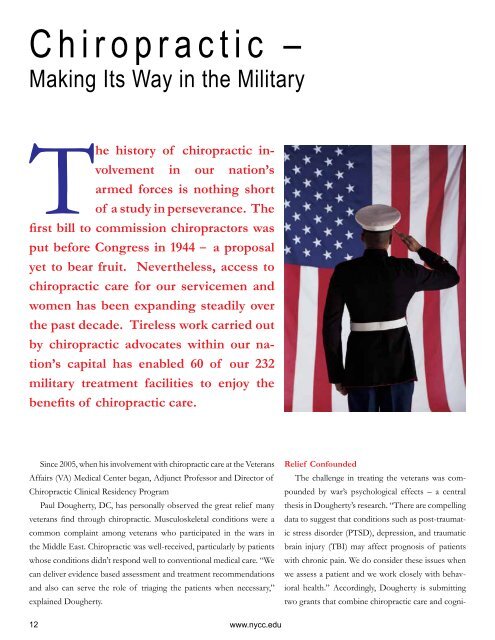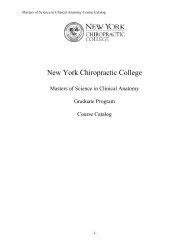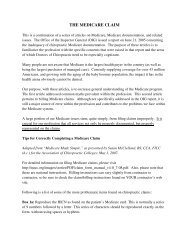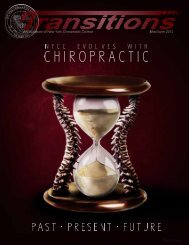July - August 2012 (PDF Version) - New York Chiropractic College
July - August 2012 (PDF Version) - New York Chiropractic College
July - August 2012 (PDF Version) - New York Chiropractic College
Create successful ePaper yourself
Turn your PDF publications into a flip-book with our unique Google optimized e-Paper software.
<strong>Chiropractic</strong> –<br />
Making Its Way in the Military<br />
The history of chiropractic involvement<br />
in our nation’s<br />
armed forces is nothing short<br />
of a study in perseverance. The<br />
first bill to commission chiropractors was<br />
put before Congress in 1944 – a proposal<br />
yet to bear fruit. Nevertheless, access to<br />
chiropractic care for our servicemen and<br />
women has been expanding steadily over<br />
the past decade. Tireless work carried out<br />
by chiropractic advocates within our nation’s<br />
capital has enabled 60 of our 232<br />
military treatment facilities to enjoy the<br />
benefits of chiropractic care.<br />
Since 2005, when his involvement with chiropractic care at the Veterans<br />
Affairs (VA) Medical Center began, Adjunct Professor and Director of<br />
<strong>Chiropractic</strong> Clinical Residency Program<br />
Paul Dougherty, DC, has personally observed the great relief many<br />
veterans find through chiropractic. Musculoskeletal conditions were a<br />
common complaint among veterans who participated in the wars in<br />
the Middle East. <strong>Chiropractic</strong> was well-received, particularly by patients<br />
whose conditions didn’t respond well to conventional medical care. “We<br />
can deliver evidence based assessment and treatment recommendations<br />
and also can serve the role of triaging the patients when necessary,”<br />
explained Dougherty.<br />
Relief Confounded<br />
The challenge in treating the veterans was compounded<br />
by war’s psychological effects – a central<br />
thesis in Dougherty’s research. “There are compelling<br />
data to suggest that conditions such as post-traumatic<br />
stress disorder (PTSD), depression, and traumatic<br />
brain injury (TBI) may affect prognosis of patients<br />
with chronic pain. We do consider these issues when<br />
we assess a patient and we work closely with behavioral<br />
health.” Accordingly, Dougherty is submitting<br />
two grants that combine chiropractic care and cogni-<br />
12<br />
www.nycc.edu

















